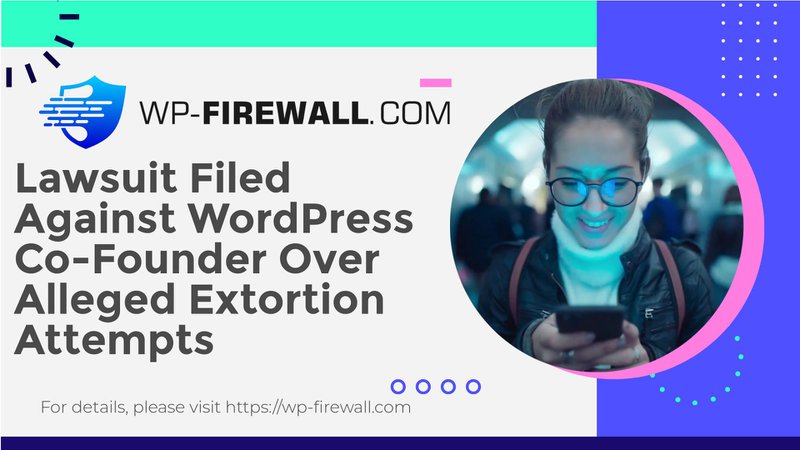
WordPress Co-Founder & Automattic Sued for Attempted Extortion: A Security Perspective
The recent lawsuit filed by WP Engine against WordPress co-founder Matt Mullenweg and Automattic has sparked a heated debate within the WordPress community. This legal battle is not just about trademark infringement but also about allegations of abuse of power, extortion, and greed. From a security perspective, this case highlights the importance of maintaining trust and transparency in the open-source ecosystem.
Background of the Dispute
The feud between WP Engine and Automattic began when Matt Mullenweg started criticizing WP Engine for allegedly infringing on WordPress and WooCommerce trademarks. Mullenweg described WP Engine as the "Cancer of WordPress," suggesting that their actions were harmful to the community. This public feud escalated when WP Engine sent a cease-and-desist letter to Automattic, asking them to withdraw these comments.
Key Allegations in the Lawsuit
- Abuse of Power and Extortion:WP Engine accuses Mullenweg and Automattic of using their power to extort money from them. Specifically, they claim that Automattic demanded an 8% royalty payment from WP Engine's monthly revenue for using the WordPress and WooCommerce trademarks. This demand was made without prior warning and included a probation period for forking plugins and extensions from Automattic and WooCommerce.
- Trademark Infringement:The lawsuit alleges that WP Engine's use of the WordPress trademark is legal under fair use. However, Automattic claims that WP Engine's actions constitute trademark infringement, which has led to significant financial losses for Automattic.
- False Statements and IRS Fraud:WP Engine accuses Mullenweg of making false statements to the IRS regarding the transfer of the WordPress trademark from Automattic to the non-profit WordPress Foundation and back to Automattic through an exclusive sublicensable license. This is seen as a violation of IRS regulations and an attempt to conceal Automattic's control over the trademark.
- Malfeasance and Broken Promises:The lawsuit asserts that Automattic has not kept its promises to run WordPress open-source projects without any constraints. Instead, it alleges that Automattic has interfered with WP Engine's operations by banning them from accessing certain resources like plug-ins and themes, which has harmed WP Engine's business and the broader WordPress ecosystem.
Security Implications
- Trust and Transparency:The open-source nature of WordPress relies heavily on trust within the community. The allegations of abuse of power and extortion threaten this trust by suggesting that key figures in the community are acting in their own self-interest rather than for the benefit of all users.
- Ecosystem Impact:The dispute between WP Engine and Automattic has broader implications for the entire WordPress ecosystem. It highlights how conflicts between major players can disrupt the normal operation of websites and impact not just one company but many others who rely on WordPress.
- Community Governance:The lawsuit raises questions about governance within the WordPress community. It alleges that Matt Mullenweg controls the WordPress Foundation for his own commercial interests, which could undermine the non-profit status of the organization and its commitment to openness and freedom.
Conclusion
The lawsuit filed by WP Engine against Matt Mullenweg and Automattic is a complex issue that involves allegations of abuse of power, extortion, trademark infringement, and malfeasance. From a security perspective, it underscores the importance of maintaining trust within an open-source community. Ensuring transparency in governance and adhering to ethical standards are crucial for preserving the integrity of such ecosystems.
Protecting Your WordPress Site from Similar Threats
To safeguard your WordPress site from potential threats like those described in this case:
- Regularly Update Plugins and Themes:Keeping your site updated with the latest plugins and themes can help prevent vulnerabilities that might be exploited by malicious actors.
- Use Strong Passwords and Two-Factor Authentication:Implementing robust security measures such as strong passwords and two-factor authentication can significantly reduce the risk of unauthorized access.
- Monitor Your Site for Malicious Activity:Regularly monitoring your site for suspicious activity can help you detect and respond to potential threats quickly.
- Use a Reliable Security Plugin:Utilizing a reputable security plugin can provide additional layers of protection against common web attacks.
By following these best practices, you can help ensure that your WordPress site remains secure and resilient against potential threats.
Why You Need WP-Firewall
In light of this ongoing dispute, it's clear that maintaining robust security measures is crucial for any WordPress site. WP-Firewall offers advanced security features designed to protect your site from various threats, including:
- Real-Time Threat Detection:WP-Firewall continuously monitors your site for suspicious activity, alerting you to potential threats in real-time.
- Advanced Malware Scanning:The plugin includes advanced malware scanning capabilities that can detect and remove malicious code from your site.
- IP Blocking:You can block IP addresses that have been flagged as malicious, preventing further attacks.
- Login Security Enhancements:WP-Firewall includes features like two-factor authentication and strong password enforcement to enhance login security.
- Regular Updates and Support:The plugin receives regular updates and support from its developers, ensuring you have access to the latest security patches and features.
By using WP-Firewall, you can significantly enhance the security of your WordPress site and protect it from potential threats like those described in this case.
Protect Your Site With Us
To protect your WordPress site from potential threats and ensure its security, consider downloading WP-Firewall today. With its advanced features and real-time threat detection, WP-Firewall is the perfect solution for safeguarding your online presence. Sign up for the WP-Firewall free plan via https://my.wp-firewall.com/buy/wp-firewall-free-plan/ to get started.

